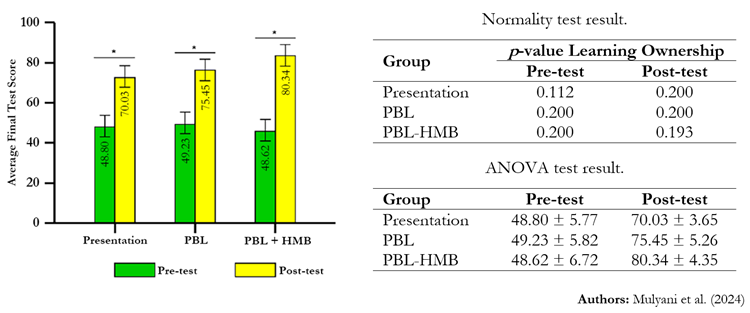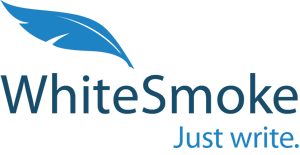
Problem-Based Learning Model Assisted with A Humanistic-Merdeka Belajar Approach Improved Biology Students’ Learning Ownership
Abstract
Fostering ownership over learning constitutes a pivotal aspect for students to cultivate a comprehensive understanding, employ cognitive strategies effectively, hone essential skills, and refine learning methodologies. Preliminary studies have underscored a prevalent deficiency in the learning ownership among biology students, categorizing it as notably low. The purpose of this study is to ascertain the effect of the Project Based Learning (PBL) model assisted with a Humanistic-Merdeka Belajar (HMB) approach, in nurturing students’ ownership of their learning endeavors. Employing a quasi-experimental design, the research adopts a pre-test post-test non-equivalent control group configuration, administered both prior to and following the intervention within each respective group. Data collection entails pre-test and post-test evaluations conducted through structured questionnaires. Subsequent data analysis involves employing one-way ANOVA and LSD post hoc tests. The findings distinctly indicate a positive and statistically significant impact of the HMB approach on students’ learning ownership. Moreover, notable disparities in learning ownership emerge between the groups utilizing the PBL-HMB, PBL, and presentations-assignment approaches. Consequently, the findings decisively suggest that the PBL-HMB amalgamation significantly enhances the ownership of learning among biology students, surpassing the effectiveness of both PBL and presentations-assignment approaches.
Keywords
Full Text:
PDFReferences
Acosta-Gonzaga, E., & Ramirez-Arellano, A. (2021). The influence of motivation, emotions, cognition, and metacognition on students’ learning performance: A comparative study in higher education in blended and traditional contexts. Sage Open, 11(2), 21582440211027561. https://doi.org/10.1177/21582440211027561
Ainia, D. K. (2020). Merdeka belajar dalam pandangan Ki Hadjar Dewantara dan relevansinya bagi pengembanagan pendidikan karakter. Jurnal Filsafat Indonesia, 3(3), 95–101. https://doi.org/10.5430/ijhe.v5n3p1
Akbari, O., & Sahibzada, J. (2020). Students’ self-confidence and its impacts on their learning process. American International Journal of Social Science Research, 5(1), 1–15. https://doi.org/10.46281/aijssr.v5i1.462
Alhadabi, A., & Karpinski, A. C. (2020). Grit, self-efficacy, achievement orientation goals, and academic performance in university students. International Journal of Adolescence and Youth, 25(1), 519–535. https://doi.org/10.1080/02673843.2019.1679202
Almulla, M. A. (2020). The effectiveness of the project-based learning (PBL) approach as a way to engage students in learning. Sage Open, 10(3), 2158244020938702. https://doi.org/10.1177/2158244020938702
Amerstorfer, C. M., & von Münster-Kistner, C. F. (2021). Student perceptions of academic engagement and student-teacher relationships in problem-based learning. Frontiers in Psychology, 12, 713057. https://doi.org/10.3389/fpsyg.2021.713057
Arends, R. I. (2012). Learning to teach. Boston, MA: McGraw-Hill.
Argaw, A. S., Haile, B. B., Ayalew, B. T., & Kuma, S. G. (2016). The effect of problem based learning (PBL) instruction on students’ motivation and problem solving skills of physics. Eurasia Journal of Mathematics, Science and Technology Education, 13(3), 857–871. https://doi.org/10.12973/eurasia.2017.00647a
Belland, B. R., Gu, J., Kim, N. J., Jaden Turner, D., & Mark Weiss, D. (2019). Exploring epistemological approaches and beliefs of middle school students in problem-based learning. The Journal of Educational Research, 112(6), 643–655. https://doi.org/10.1080/00220671.2019.1650701
Bridges, A. H. (2006). A critical review of problem based learning in architectural education. In V. Bourdakis, & D. Charitos (Eds.), Communicating space(s). Proceedings of the 24th Conference on Education in Computer Aided Architectural Design in Europe (pp. 182–189). University of Thessaly, Volos, Greece. https://doi.org/10.52842/conf.ecaade.2006.182
Case, A. S. (2022). The role of teachable ownership of learning components in college adjustment. Journal of Student Affairs Research and Practice, 59(2), 180–195. https://doi.org/10.1080/19496591.2020.1825459
Chan, P. E., Graham-Day, K. J., Ressa, V. A., Peters, M. T., & Konrad, M. (2014). Beyond involvement: Promoting student ownership of learning in classrooms. Intervention in School and Clinic, 50(2), 105–113. https://doi.org/10.1177/1053451214536039
Conley, D. T., & French, E. M. (2014). Student ownership of learning as a key component of college readiness. American Behavioral Scientist, 58(8), 1018–1034. https://doi.org/10.1177/0002764213515232
Coutts, L. (2019). Empowering students to take ownership of their learning: Lessons from one piano teacher’s experiences with transformative pedagogy. International Journal of Music Education, 37(3), 493–507. https://doi.org/10.1177/0255761418810287
Daga, A. T. (2021). Makna merdeka belajar dan penguatan peran guru di sekolah dasar. Jurnal Educatio FKIP UNMA, 7(3), 1075–1090. https://doi.org/10.31949/educatio.v7i3.1279
Dawood, O., Rea, J., Decker, N., Kelley, T., & Cianciolo, A. T. (2021). Problem-based learning about problem-based learning: Lessons learned from a student-led initiative to improve tutor group interaction. Medical Science Educator, 31, 395–399. https://doi.org/10.1007/s40670-021-01259-1
Evans, R. I. (1975). Carl Rogers: The man and his ideas. New York, NY: Dutton.
Firdaus, F. A., & Mariyat, A. (2017). Humanistic approach in education according to Paulo Freire. At-Ta'dib, 12(2), 25–48. https://doi.org/10.21111/at-tadib.v12i2.1264
Fitri, S. F. N. (2021). Problematika kualitas pendidikan di indonesia. Jurnal Pendidikan Tambusai, 5(1), 1617–1620. https://www.jptam.org/index.php/jptam/article/view/1148
Frith, C. D. (2012). The role of metacognition in human social interactions. Philosophical Transactions of the Royal Society B: Biological Sciences, 367(1599), 2213–2223. https://doi.org/10.1098/rstb.2012.0123
Ghanizadeh, A. (2017). The interplay between reflective thinking, critical thinking, self-monitoring, and academic achievement in higher education. Higher Education, 74, 101–114. https://doi.org/10.1007/s10734-016-0031-y
Hendriana, H., Slamet, U. R., & Sumarmo, U. (2014). Mathematical connection ability and self-confidence (An experiment on junior high school students through contextual teaching and learning with mathematical manipulative). International Journal of Education, 8(1), 1–11. https://doi.org/10.17509/ije.v8i1.1726
Hmelo-Silver, C. E., & Barrows, H. S. (2006). Goals and strategies of a problem-based learning facilitator. Interdisciplinary Journal of Problem-Based Learning, 1(1), 21–39. https://doi.org/10.7771/1541-5015.1004
Jingna, D. U. (2012). Application of humanism theory in the teaching approach. Higher Education of Social Science, 3(1), 32–36. https://doi.org/10.3968/j.hess.1927024020120301.1593
Kasali, R. (2018). Strawberry generation. Bandung, Indonesia: Mizan.
Kassaw, K., & Astatke, M. (2017). Gender, academic self-efficacy, and goal orientation as predictors of academic achievement. Global Journal of Human Social Science: Arts and Humanities–Psychology, 17(6), 55–65.
Koca, F. (2016). Motivation to learn and teacher-student relationship. Journal of International Education and Leadership, 6(2), 1–20. https://files.eric.ed.gov/fulltext/EJ1135209.pdf
Kurdi, M. S. (2018). Evaluasi implementasi desain pendidikan karakter berbasis pendekatan humanistik. Elementary: Jurnal Iilmiah Pendidikan Dasar, 4(2), 125–138. https://doi.org/10.32332/elementary.v4i2.1243
Liang, X., Collins, L. J., Lenhart, L., & Ressa, V. (2020). Instructional change following formative instructional practices professional development. Teacher Development, 24(1), 108–125. https://doi.org/10.1080/13664530.2019.1705886
Lindsjö, K. (2018). Contextualizing the quality of primary education in urban and rural settings: The case of Iringa Region, Tanzania. Norsk Geografisk Tidsskrift-Norwegian Journal of Geography, 72(4), 234–247. https://doi.org/10.1080/00291951.2018.1492962
LLDIKTI Wilayah VI. (2021, November 29). Indonesia butuhkan generasi muda berkarakter dan berdaya saing. Retrieved from https://lldikti6.kemdikbud.go.id/2021/11/29/indonesia-butuhkan-generasi-muda-berkarakter-dan-berdaya-saing/
Lone, R. A. (2021). Self-confidence among students and its impact on their academic performance: A systematic review. International Journal of Creative Research Thoughts, 9(2), 561–565.
Mutlu, G., & Yıldırım, A. (2019). Learning environment perceptions and student background variables as determinants of persistence in EFL learning. Sage Open, 9(4), 2158244019898805. https://doi.org/10.1177/2158244019898805
Nurbani, D. F., Ardijansah, D., Akbar, W. J., Prasetya, I. H., & Heriyanto, W. (2020). Buku saku merdeka belajar: Prinsip dan implementasi pada jenjang pendidikan SMA. Jakarta, Indonesia: Kementerian Pendidikan dan Kebudayaan. https://repositori.kemdikbud.go.id/20029/1/Buku Merdeka Belajar 2020.pdf
Nurhuda, H. (2022). Masalah-masalah pendidikan nasional; Faktor-faktor dan solusi yang ditawarkan. Dirasah: Jurnal Pemikiran dan Pendidikan Dasar Islam, 5(2), 127–137. https://stai-binamadani.e-journal.id/jurdir/article/view/406
Owusu-Agyeman, Y., & Fourie-Malherbe, M. (2019). Negotiating co-ownership of learning in higher education: an underexplored practice for adult learning. Studies in Continuing Education, 41(1), 17–35. https://doi.org/10.1080/0158037X.2018.1497591
Pangestu, D. A., & Rochmat, S. (2021). Filosofi merdeka belajar berdasarkan perspektif pendiri bangsa. Jurnal Pendidikan dan Kebudayaan, 6(1), 78–92. https://doi.org/10.24832/jpnk.v6i1.1823
Patandung, Y., & Panggua, S. (2022). Analisis masalah-masalah pendidikan dan tantangan pendidikan nasional. Jurnal Sinestesia, 12(2), 794–805. https://sinestesia.pustaka.my.id/journal/article/view/277
Pratama, N. Y. P., Isa, S. F. P., & Yunita, S. (2022). Analisis penyebab rendahnya relevansi pendidikan dengan tuntutan masyarakat. Jurnal Pendidikan Tambusai, 6(2), 9752–9759. https://doi.org/10.31004/jptam.v6i2.3937
Rahmat, A., & Hindriana, A. F. (2014). Beban kognitif mahasiswa dalam pembelajaran fungsi terintegrasi struktur tumbuhan berbasis dimensi belajar. Jurnal Ilmu Pendidikan, 20(1), 66–74. http://dx.doi.org/10.17977/jip.v20i1.4379
Sari, M. S., Sunarmi, S., & Sulasmi, E. S. (2017). Analisis kemampuan literasi sains mahasiswa Jurusan Biologi UM pada matakuliah struktur perkembangan tumbuhan. In E. Yulianti, & R. C. Handziko, Penelitian, pendidikan dan penerapan biologi untuk mendukung pencapaian sustainable development goals (SDGs). Proceedings of the Prosiding Seminar Nasional 2017 Jurusan Pendidikan Biologi FMIPA UNY (pp. PB-1–PB-6). Yogyakarta, Indonesia. http://seminar.uny.ac.id/sembiouny2017/sites/seminar.uny.ac.id.sembiouny2017/files/PB%201.pdf
Schnell, K., Ringeisen, T., Raufelder, D., & Rohrmann, S. (2015). The impact of adolescents' self-efficacy and self-regulated goal attainment processes on school performance—Do gender and test anxiety matter?. Learning and Individual Differences, 38, 90–98. https://doi.org/10.1016/j.lindif.2014.12.008
Soedijarto, S., Thamrin, T., Karyadi, B., Siskandar, S., & Sumiyati, S. (2010). Sejarah pusat kurikulum. Jakarta, Indonesia: Pusat Kurikulum, Badan Penelitian dan Pengembangan, Kementerian Pendidikan Nasional.
Tinto, V. (2017). Reflections on student persistence. Student Success, 8(2), 1–8. https://doi.org/10.5204/ssj.v8i2.376
Treve, M. (2021). Study of humanistic education: Concerns, implications, and applications. Turkish Journal of Computer and Mathematics Education (TURCOMAT), 12(11), 6303–6310. https://doi.org/10.17762/turcomat.v12i11.7005
Tulasi, L., & Rao, C. S. (2021). A review of humanistic approach to student centred instruction. The Review of Contemporary Scientific and Academic Studies, 1(1), 1–5. https://thercsas.com/wp-content/uploads/2022/01/Laxmi.rcsas_.1.1.01.pdf
Vhalery, R., Setyastanto, A. M., & Leksono, A. W. (2022). Kurikulum merdeka belajar kampus merdeka: Sebuah kajian literatur. Research and Development Journal of Education, 8(1), 185–201. https://doi.org/10.30998/rdje.v8i1.11718
Widyastuti, R. (2021). Relevansi pemikiran Ki Hajar Dewantara dengan konsep merdeka belajar. Prosiding Seminar Nasional Manajemen Pendidikan, 2(1), 1068–1077. https://jurnal.ustjogja.ac.id/index.php/semnasmp/article/view/10880
Wiggins, S., Chiriac, E. H., Abbad, G. L., Pauli, R., & Worrell, M. (2016). Ask not only ‘What can problem-based learning do for psychology?’but ‘What can psychology do for problem-based learning?’A review of the relevance of problem-based learning for psychology teaching and research. Psychology Learning & Teaching, 15(2), 136–154. https://doi.org/10.1177/1475725716643270
Jurnal Pendidikan Sains Journal of Science Education Graduate School of Universitas Negeri Malang, Indonesia JPS is licensed under Creative Commons Attribution-ShareAlike 4.0 International License |







